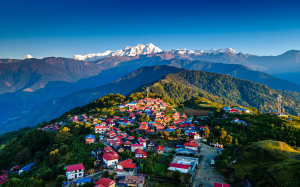Money
Arghakhanchi starts expansion project
Leading cement manufacturer Arghakhanchi Cement has obtained a consortium loan pledge to finance the expansion of its cement plant. The company has planned to boost its production capacity to 3,000 tonnes daily from the current 1,200 tonnes.
Leading cement manufacturer Arghakhanchi Cement has obtained a consortium loan pledge to finance the expansion of its cement plant. The company has planned to boost its production capacity to 3,000 tonnes daily from the current 1,200 tonnes.
Arghakhanchi expects to spend Rs4.13 billion including Rs2.89 billion in consortium financing on its expansion project. It has received a loan pledge worth Rs2.89 billion from six commercial banks, it said in a press release.
The consortium is led by Nabil Bank and includes Nepal Bank, NIC Asia Bank, Global IME Bank, Prime Bank and Century Bank.
Director of Arghakhanchi Cement Manoj Kedia and chief executive officer of Nabil Bank Sashin Joshi signed a lending agreement on Friday.
The Siddhartha Group, Murarka Organisation, Kedia Organisation and India’s Uma Cement International, the company’s promoters, will invest Rs1.24 billion in the expansion project.
Arghakhanchi Cement will be the largest domestic cement factory after the expansion is completed in one and a half years, the company claimed. Rajesh Agrawal, managing director of the company, said that they started the construction of the factory’s infrastructure two months ago. “The underground infrastructure is almost complete, and the foundation will be ready within 15 days,” he said.
The company also said that it had opened a letter of credit to buy a factory based on VRM technology from FLSmidth & Company. Almost all domestic cement factories have launched expansion plans, spurred by fear of being left behind as several large-scale foreign plants are being built in the country.
“If we don’t increase our capacity and achieve economy of scale, we will vanish once big plants with foreign investment start producing cement,” said Agrawal.
Dangote Cement of Nigeria, Hongshi and Huaxin of China and Reliance Cement of India have received government approval to start operations in Nepal. Their combined foreign direct investment (FDI) amounts to $1.45 billion and their proposed output stands at 22,000 tonnes daily.
“Large-scale foreign investment is one of the reasons why we are expanding our capacity along with still high clinker imports from India.” According him, about 40 percent of the clinker required by domestic factories is sourced from abroad. “Our factory will be based on domestic clinker,” he added.




 28.53°C Kathmandu
28.53°C Kathmandu












